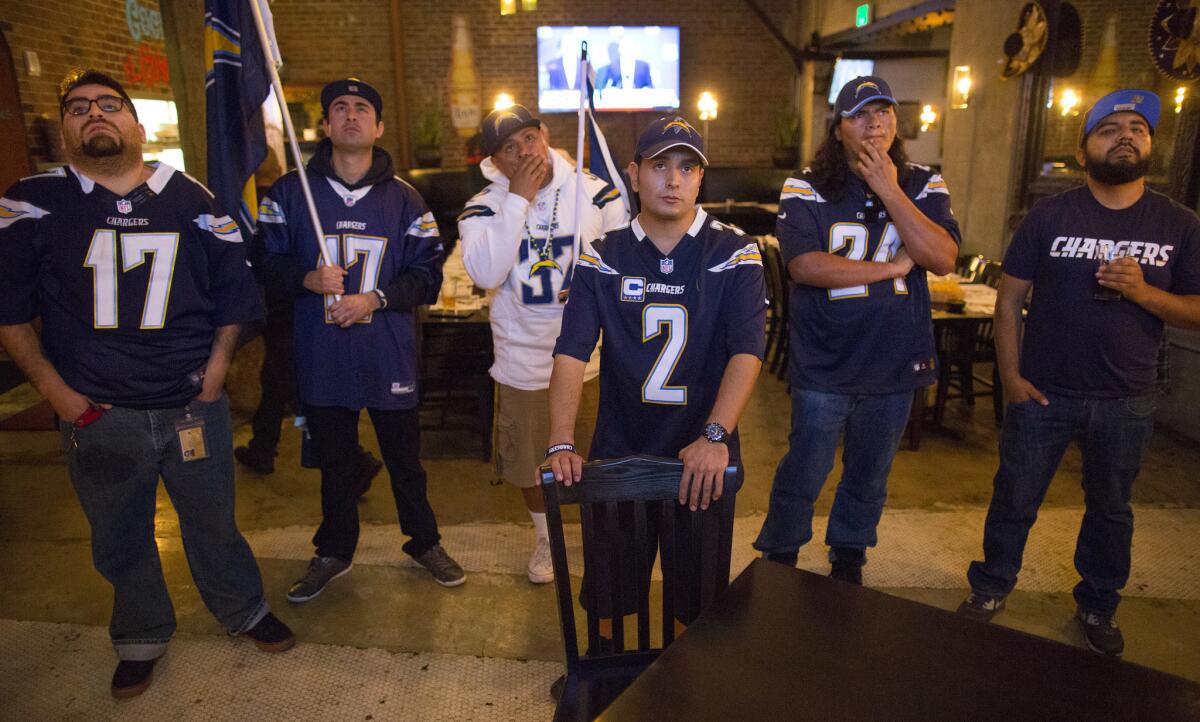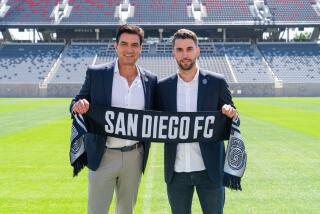Chargers’ future in San Diego up to owner Dean Spanos

Los Angeles fans of the San Diego Chargers react to news from the NFL owners meeting during a meet-up at El Compadre Restaurant on Jan. 12.
- Share via
FROM SAN DIEGO — San Diego’s civic leaders, while buoyed by the news that they have yet another shot at holding onto the hometown team, said it will only succeed if the Chargers ownership really wants to stay.
As word spread that team owner Dean Spanos was given the option of striking a deal with Rams owner Stan Kroenke to move to a new stadium in Los Angeles or renew talks to stay put, local stakeholders agreed there is still time — and hope —for getting public approval via the ballot.
Much, though, depends on whether Spanos can work out a deal with Kroenke that he believes will be more favorable to the team financially than remaining in San Diego.
See the most-popular stories in Sports this hour>>
“I think San Diego has their ninth life on this,” said Jim Steeg, a member of Mayor Kevin Faulconer’s stadium task force and a former Chargers and NFL executive. “I’m sure what’s going to transpire, since they’re both sitting in Houston, is there will be a meeting with the two of them, and they’ll find out what’s there and what isn’t. Either you (Spanos) will be a tenant or a partner. But I hope there are those in San Diego who are already reaching out.”

NFL owners voted to allow the St. Louis Rams to move to Los Angeles and give the San Diego Chargers the option to join. The Oakland Raiders will not be moving to Los Angeles.
There were reports Tuesday night that such discussions were indeed taking place.
“This is a deal that will last (Spanos’) lifetime so it’s important that it’s done properly and he feels secure up there,” Steeg continued. “But if I were him, I’d explore whatever option I have here in San Diego because he has leverage against what is going on up there. The next 24 hours are critical.”
So you’re new to L.A. and need a temporary NFL venue? Try the Coliseum first
Faulconer and county Supervisor Chairman Ron Roberts, while open to restarting negotiations, weren’t entirely conciliatory in a joint statement released Tuesday evening.
“Today, NFL owners rejected the Chargers’ bid to move to Carson,” the statement said. “If Mr. Spanos has a sincere interest in reaching a fair agreement in San Diego, we remain committed to negotiating in good faith. We are not interested in a charade by the Chargers if they continue to pursue Los Angeles.”
While the city and county initiated negotiations with the Chargers last year on building a new stadium in Mission Valley, they ultimately fizzled after the team walked away in June. Meanwhile, Faulconer has said all along he remains committed to a public vote this year on the question of spending public money on a new sports facility that could cost $1.1 billion.
Perhaps the most optimistic about the chances of the Chargers remaining in San Diego is Adam Day, who chaired the mayor’s task force. San Diego is still a willing partner, and even better, said Day, is the NFL’s offer of an additional $100 million to help finance a stadium deal in San Diego.
“After 12 months of drama and angst we’re right back to square one,” said Day. “But if the team wants to honestly negotiate, there is a path forward in San Diego. I think the ball is in the franchise’s court. They have a tremendous fan base, the overtures from San Diego have been made, the ground work has been laid, and there is still room to maneuver, whether it’s downtown or Mission Valley.
“Today is a reminder that there is a solution to be had.”
Aimee Faucett, executive vice president and chief operating officer at San Diego Regional Chamber of Commerce, gave the Chargers only 25 percent odds of staying here.
“LA is their top priority (from a financial standpoint),” she said. “Until they have exhausted all options (in LA), they really aren’t going to be at the table with sincere negotiations with our city and our region.”
Former San Diego City Councilman Carl DeMaio was also pessimistic about the city’s chances of bringing Spanos back to the bargaining table and doubts city taxpayers would favor spending public money on a stadium.
“At the end of the day I don’t see how the math adds up for for a package to pass in San Diego,” DeMaio said. “San Diegans don’t have a large appetite for subsidizing a billion-dollar industry after all the money we’ve pumped ino the Chargers and after the way we’ve been treated.”
San Diego City Councilman Scott Sherman, whose district includes Qualcomm Stadium, rated the odds of staying slightly better, at 40 percent. Even so, he said negotiations should resume directly with Spanos.
“I think we’re all big boys and girls,” he said. “I would like to have a chance to keep the Chargers in the eighth largest city in the country. It’s important to keep the Chargers here.”
Mark Cafferty, president and CEO of the San Diego Regional Economic Development Corp., said he was surprised by Tuesday’s outcome but hopeful an agreement could be reached with the Chargers.
But if the Chargers do ultimately leave, he said other professional sports teams may move here, and there are many other options for redeveloping the Qualcomm site.
“There are many reasons why San Diego is a remarkable place to live and do business,” he said, “with or without the Chargers.”
ALSO
Plaschke: The big, bad NFL will have to play by L.A.’s rules
It’s official: Rams are coming back to L.A. this year
Here’s where L.A.’s NFL team (or teams) might play while a new stadium is built
More to Read
Go beyond the scoreboard
Get the latest on L.A.'s teams in the daily Sports Report newsletter.
You may occasionally receive promotional content from the Los Angeles Times.










